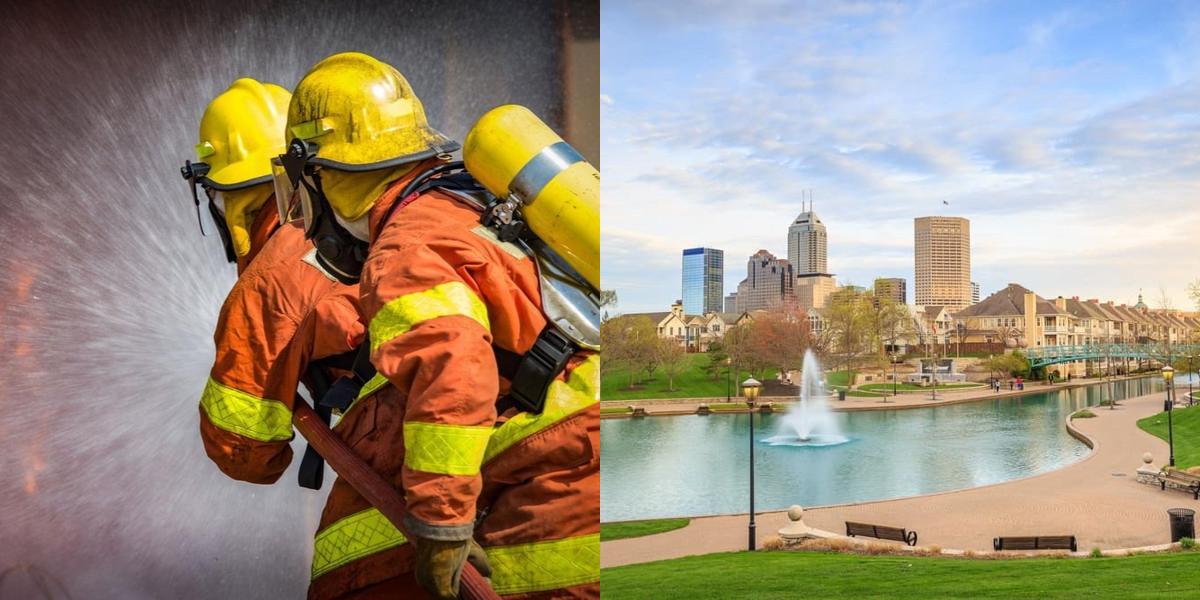How to Become a Firefighter in Indiana (2025)

Becoming a Firefighter in Indiana is one of the most respected and community-driven careers in public service. Firefighters protect lives and property, respond to emergencies, and promote fire safety across the state. Indiana firefighters earn an average of $61,850 per year ($29.74 per hour), according to the U.S. Bureau of Labor Statistics. This guide explains every step so you can begin your firefighting journey with confidence.
4. Background Investigation and Fingerprinting
A full background check includes criminal history and driving records. Fingerprinting is required before final consideration.
5. Aerial Climb Test
Applicants climb up and down a ladder within a timed window to test agility and balance. Comfortable clothing and gloves are recommended.
6. Medical and Mental Health Exams
- Mental exam: Lasts around two hours, followed by a psychologist interview.
- Medical exam: Includes body fat measurement, hearing and vision tests, treadmill evaluation, bloodwork, and urine analysis.
Successful candidates receive recommendations from department-approved physicians.
After completing all tests, those who pass the aerial, mental, and medical exams may receive a conditional job offer.
Recruit School
New recruits attend the Indianapolis Fire Department Training Academy for 28 weeks, Monday through Friday from 6:30 a.m. to 5:00 p.m. Recruits are paid while in training.
Training Includes:
- EMT certification courses
- Hazardous materials and fire behavior
- Extrication and flashover simulations
- Search and rescue operations
- Physical conditioning and daily fitness testing
Graduates earn Firefighter I/II certification, EMT certification, and are assigned to a firehouse as probationary firefighters.
Benefits and Opportunities
The Indianapolis Fire Department (IFD) and similar departments across Indiana offer extensive benefits and career advancement options.
Employee Benefits
- Health, dental, vision, and life insurance
- Pension eligibility after 20 years of service
- 457B matching funds program
- Paid vacation starting in year two
- Kelly day assignment every third week
- College incentive pay based on earned credits
- Credit union membership
- Employee assistance services
- IAFF union membership
- Overtime and special position pay
Specialized Career Opportunities
Firefighters can specialize in advanced fields such as:
- Extrication and heavy rescue
- Rope rescue (high and low angle)
- Arson investigation
- Fire code enforcement and prevention
- Emergency medical technician or paramedic roles
- Public fire education
- SCUBA and water rescue
- Confined space rescue
- Urban search and rescue
These specializations allow firefighters to expand their skills and increase earnings over time.
Career Paths and Opportunities after Becoming a Firefighter
After completing training, firefighters can progress into roles such as:
- Fire Captain or Battalion Chief – Supervises teams and manages operations.
- Fire Marshal or Inspector – Conducts safety inspections and code enforcement.
- Fire Investigator – Determines the cause of fires.
- Emergency Management Officer – Plans disaster response efforts.
- Instructor or Training Officer – Trains recruits and leads continuing education.
Frequently Asked Questions
How long does it take to become a firefighter in Indiana?
Training and testing typically take 12–16 weeks, followed by a 28-week recruit academy.
How much does a firefighter make in Indiana?
The average firefighter salary is $61,850 per year ($29.74/hour), per BLS.
Do you have to be an EMT to be a firefighter in Indiana?
Yes, all new recruits graduate as certified EMTs through the Indiana Fire Academy or IFD Recruit School.
Does Indiana have a fire academy?
Yes, the Indiana Fire and Public Safety Academy and the Indianapolis Fire Department Training Academy provide statewide firefighter education and certification.
Final Thoughts
Becoming a firefighter in Indiana takes dedication, discipline, and a passion for public service. By meeting age and education requirements, passing the CPAT and written exams, and completing recruit school, you can start a rewarding career serving your community.
Ready to begin your journey? Explore firefighter training programs in Indiana through Dreambound and take your first step toward earning your badge.
Thinking about making a big change in your career path? It's important to be well-informed before starting off on your journey. Dreambound has written hundreds of in-depth guides to help. Explore some of these resources below.

Blessed Joy Amarga is part of the Growth and Sales teams at Dreambound. She helps bring in new leads, increasing the number of people at the top of the sales funnel, and supporting the team in creating graphics to boost social media engagement. Blessed is also a Licensed Architect. Outside work, she enjoys traveling and exploring new places for her vlog.




